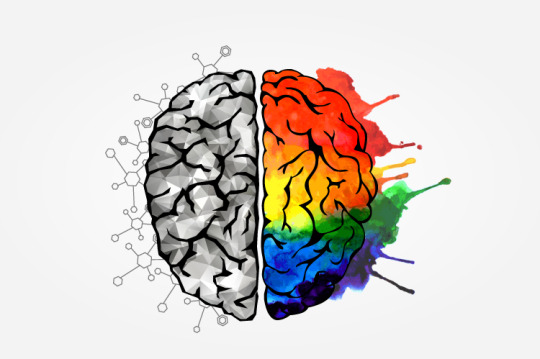Don't wanna be here? Send us removal request.
Text
Post 6: Conclusions

Over the course of this research project I found many interesting points attempting to answer how one’s perception of happiness impacts success. In my first post I discussed the basics on this topic and found that the brain works differently in positive and negative situations, which is expected because if a person has a positive viewpoint then our brains are more active and creative. Learning this led me to asking questions about how the perception of happiness differs between individual persons. I stated at the end of this first post that I was hoping to find a similar article to the one I used that states different ways with which one can attain a more positive mindset. I think that through researching the subtopics that I did I was able to find a conclusion to this question. I found through the other topics that having a positive mindset depends on a lot of factors in one’s life. For example, one’s career, family-life, childhood, and culture. To dive deeper into this question I began with gender.

With researching gender, I found that women are much more likely to express and recognize their own as well as other’s emotions, which I found very interesting because I never before thought that women could feel differently than men. I learned that because of this factor, women remain happier for longer periods of time when they are confronted with positive emotions, and are more successful when faced with emotionally difficult situations. With this, I conclude that women perceive happiness as an emotional state, and because men are unable to understand their emotions, they are typically less happy. This affects success because women would be more likely to choose a life that satisfies their positive emotions, and men would choose a lifestyle that pays the bills.

Through my research on gender, I found an article that really got my interested in how perceived happiness differs between cultures. I found that Americans associate happiness with good experiences and personal achievements, and that people from other countries such as Japan believe happiness is a social harmony. This topic was much harder to research because there was not many sources on how success differs between cultures. However, I did find that when different people from different countries learn how to accept each other’s culture and work together, it will create a more successful world economy.

I then turned to researching how views on happiness and success differentiate between generations. I found that the Millennial generation is much more open to new ideas and adventure than previous generations, and also that they think of success in experiences rather than stability in life and income. This shows that the Millennial generation believes that in order to be happy, they do not need money or material items but wanderlust and adventure. I also found that the Millennial generation is much more likely to choose a career path that satisfies their life goals and well-being, where as past generations chose jobs that provide control in their lives with a steady income.

Lastly, I researched how perceived happiness varies between developing and developed countries. I first found that happiness is not directly correlated with the growing wealth of a country, which shows that most countries do not associate success with happiness. I thought it was interesting to learn that wealthy countries are typically more happy than poorer countries, but as wealth increases in a country the citizens do not become happier. I concluded with this research that because there is not a direct correlation between happiness and a wealthy economy that more and more countries are changing from thinking in a materialistic way to a general life-satisfaction and positive mindset.

Through all the research that I conducted, I truly think that one’s perception of happiness does impact success in both positive and negative ways.
#happiness#sucess#perception#gender#culture#generation#millennials#developingcountries#developedcountries#positive#mindset
0 notes
Text
Post 5: Developed Countries vs. Developing Countries
It is really interesting to think about how different developed countries are from developing countries, so I wanted to learn about how happiness is perceived differently compared to both and how that impacts success.

To begin, I went to Google and I typed in “developing countries vs developed happiness,” and I received many great results. I clicked on my first option from The Guardian, titled “Happiness doesn’t increase with growing wealth of nations, finds study,” written by Alok Jha. This source is credible because it comes from a trusted news site. The article stated that “the sense of wellbeing in a country’s citizens [does] not go up with income,” which shows that economic growth is not directly correlated with happiness. This also illustrates that citizens of certain countries could have a different perception of happiness other than economic stability and increased incomes. A quote by Alexander Gorban, a mathematician at the University of Leicester, states “it [is] difficult to quantify happiness because of the problem of comparing material and subjective wellbeing,” which is a great point. This is exactly why I wanted to research how one’s perception of happiness influences success because I am interested in how non-subjectivity impacts happiness. I found it really interesting that citizens in developed, richer countries are, on average, happier than those in developing and poorer countries. Also, the study discussed in the article found that even though the above statement is true about richer countries having a better state of well-being, it does not show that as wealth increases its citizens become happier.

Through reading this article I learned that the overall happiness of countries is not associated with the economic status of the country itself. Instead, I found that well-being means much more than what people typically think. Citizens of both developing and developed countries may think that a better economy will effect them in a positive way and make their lives more enjoyable; however, this is not a lasting effect and those people will ultimately end up disappointed. This article also proves the previous point made about how success does not equally happiness.

I think that the conclusions this study found are really helpful to my research because it shows that there is not a direct correlation between an expanding and improving economy and happiness. Because there is no correlation, I think that the perception of happiness in countries is making a shift from a material-based thought of happiness, to a more personal and reflective thought of happiness for the individual.
“THE INDIVIDUAL HAS ALWAYS HAD TO STRUGGLE TO KEEP FROM BEING OVERWHELMED BY THE TRIBE.” Friedrich Nietzsche
0 notes
Text
Post 4: Generational Happiness and Success

Yesterday, while I was researching about culture, I came across a very interesting source titled, “Ever wondered why your version of success differs from your parents?” And suddenly I was very interested. I had not perviously thought about doing research on generational success and happiness but when I saw this article the idea struck me. The article seemed credible because it showed statistics and research that was used to gain the information. The author, Gabriella Chaudhri, stated that “[the Millennials] are the generation re-defining normality,” which I think is very true because we have very open minds and are conscious of the world around us. I could not agree more with Chaudhri when she said, “for Millennials, success is...measured in experiences that push our boundaries [and] challenges that redefine what we once though impossible” because I too feel this way about success in my own life. She also stated that success used to be “stability, income [and] marriage,” which is also a very true statement. I have experienced this view from my own parents when they tell me that I am not going to make any money being a High School teacher, but I know that is what I want to do, and if I enjoy my life as a teacher then money should not matter. What I learned from this article is that my generation wants to do things our way and at our own pace. We do not want to follow any “having a family of five by thirty,” or other societal norms solely because we tend to seek more adventure, experience, and wanderlust.

I included my own picture here because I believe that my life is a perfect example of the modern Millennial. I love to travel. I love to find new adventures. I love taking pictures. I love the company that I keep. I absolutely love getting to know different people from all different places. And I think this picture is an accurate representation of all of those things.

The Millennial generation obviously perceives success differently from their parents, but how does their happiness impact this idea of success? I went out to find this answer on the Library Database by typing in “millennials” and “happiness.” I ended up finding a credible article discussing how a “work café experience attracts all generations, but [in different ways],” with information provided by Mars Drinks. What I learned from the article was that Millennials are more commonly “driven by a sense of purpose” in the work place because they tend to be more demanding and want to be in charge. While on the other hand, other generations often need to have control in order to thrive in the work place. The article then discussed how these views on well-being or happiness at work affect how employees utilize a work café. Mars Drinks concluded that Millennials “look at work cafés as an alternative work space,” which shows that success to them is made through hard work and determination. This could also mean that Millennials are happy with their careers, so they are more likely to continue working. However, Generation X workers were found to see work cafés as a place to destress and to take a break, which could be a sign that they are not interested in their work or career. I thought that this article was really interesting because it shows that Millennials are more likely to choose career paths that they are content with, while other generations choose certain work places for the income, location, or work benefits.

I really believe that both of these articles helped me better understand how happiness is perceived differently throughout generations, and how that perception affects success. It is clear that the Millennial generation is much more open-minded about their happiness and is willing to take more risks to be successful, where past generations are non-risk taking people who take the job for the sake of the salary.
#millennials#generationy#generationx#babyboomers#happiness#success#perception#career#workplace#travel#wonderlust#adventure#contentment
0 notes
Text
Post 3: Happiness in Culture

I have always been interested in how cultures around the world differentiate from each other, and I thought it would be a good topic to research happiness with. I came across this idea when I was researching for my previous post about gender. So, I found my first source the same way I did before. I went to Google and I typed in “how does perception of happiness impact success based on gender,” and I found a great article titled “How Does Culture Affect Our Happiness,” written by Marianna Pogosyan Ph.D.. I find this source credible because it is written by a trusted author with a Ph.D. and it is published on a widely know site: Psychology Today. I learned through reading the article that “happiness is the most accurately recognized expression across cultures.” However, the features of happiness differ across cultures. For example, I read that the Japanese think of happiness as a social harmony, whereas Americans associate happiness with “positive experiences as well as personal achievements.” I also think this says a lot about how Americans view success because we think of success as the ultimate goal, which explains why we associate happiness with positive experiences. But in other countries, like Japan, the people believe happiness is a calm state of living.
I also found that constantly pursuing happiness can be correlated with “negative consequences on [the] well-being [of] Americans,” which shows that there is a point where wanting success so bad can affect one’s life. This also illustrates that Americans perceive happiness as a material item, whereas other countries around the world believe that happiness comes from within.

I wanted to learn more about how the perception and reality of success differ among cultures around the world, so I went to the Library Database and typed in the words “success” and “culture.” All I found was sources that dealt with cultural success in a specific place, not how success is different throughout cultures. So, I had to refine my search. However, I once again came up empty handed. I then returned to Google where I typed in “how success is different cultures” Here I found titled, “Measuring success around the world,” this source is credible because specific information is cited throughout the source by trusted resources. The article stated that there has not been much research done on how people in different cultures view success, which I find very surprising because this seems like a topic worth researching. I then found another article written by Roger Trapp titled, “Why Successful Leaders Acknowledge Cultural Differences,” which was a bit off my topic but I found it useful. The source is credible because it comes from the trusted Forbes Magazine. I learned from the article humans are “conditioned by upbringing”, so naturally we are all different and we all have different views on topics such as success, and also our perceptions of happiness. The author stated that we need to have “the ability to decode cultural differences in order to work effectively with clients, suppliers, and colleagues from around the world.” I find this really interesting because it shows that in order to be successful we must be able to understand and communicate effectively with other persons.

Although I did not find a concrete answer to how perceptions of success differ across different cultures, I was able to ask more questions about how one’s upbringing can impact their views and opinions.
#success#happiness#forbes#alberteinstein#views#opinions#questions#culture#japanese#americans#pursuitofhappiness#google
0 notes
Text
Post 2: Gender vs. Perception vs. Success
To begin research on how gender impacts one’s perception of happiness, I first used Google. I typed in “how does perception of happiness impact success based on gender,” and I found many valuable articles. One of which a journal article from the National Center for Biotechnology that discusses how women can more easily understand and express emotion than men. Witten by Uta-Susan Donges, Anette Kersting, and Thomas Suslow, the journal explores ideas based on “the female advantage in emotion recognition.” I find this source credible because it is written by trusted professors and is peer reviewed by an outside editor. I found this article really interesting because it discussed how women are naturally more emotional than men. The study conducted showed that “there exist gender differences in affective priming due to happy facial expression,” which means that “women showed a significantly stronger positive evaluation shift in the happy prime condition than men.” It is crazy to me that women can feel differently than men. This illustrates that women are more likely to remain happy or positive when they are confronted with positive emotions; thus, making them more successful when faced with emotionally difficult situations.

Since the first article I found focused more on emotions and happiness rather than success, I then decided to strictly conduct research on success differences between genders. For this, I chose to use the Library Database and I typed in “success” and “gender.” With this, over 862,129 results were returned to me. However, I managed to find an excerpt from the Journal of Experimental Social Psychology titled “Wimpy and undeserving of respect: Penalties for men’s gender-inconsistent success,” written by Madeline Heilman and Aaron Wallen. While reading I found that “when [success] violates gender norms, [it] can be disadvantageous for both men and women,” which I found was really interesting. The journal stated that when men were placed in a typically “female gender-typed job,” they were less effectual and earned less respect than women in the same position. The authors concluded that “success is not always advantageous.” One thing that was really beneficial about this article to my research on the perception of happiness and success was that the authors made a conclusion about how “if success implies talents and skills that are undesirable for the individual...it can induce negative...reactions,” which proves the earlier point that success does not equal happiness, but that positivity and happiness are required for success.

Overall, I thought both of these articles were very beneficial to my research because they helped me better understand how emotions vary between genders, as well as, how success is perceived with different “gender-typed” jobs.
0 notes
Text
Post 1: How does one’s perception of happiness impact success?
The idea for this question came about in my philosophy class where we are studying what happiness is and how we can attain it. It truly is a very confusing topic and is really hard to understand even before you begin reading Aristotle or Socrates. However, I have always wondered about the psychological aspects of happiness and how our brain works within itself. With this, I pose the question: How does one’s perception of happiness impact success?

To begin my research, I literally typed this exact question, word-for-word, into Google, and surprisingly the first few sources seemed really interesting and worth the read. The first one was from Forbes magazine titled, “How Happiness Directly Impacts Your Success” by Kathy Caprino, perfect right?! Or so I thought... for the article only left me with more questions, which I will discuss later. The article was talking about a psychology professor, Shawn Achor, from Harvard who had amazingly uncovered how the human brain works in negative versus positive situations. He discussed how as a society, we tend to think about how success will lead us to happiness; however, he argues the exact opposite. Achor says that happiness is what causes success because when we are optimistic and positive, our brains are more active, creative, and energetic. I found this really interesting because it outlines the basis of my question, that happiness does indeed impact success, but at what point is too much? Is there a breaking point between happiness and success, meaning is there a certain height of happiness that one has to meet before they reach success? Does happiness vary between persons? Gender? Socio-economic status? These are just some of the questions that came up while I was reading this article.

One thing that I found really intriguing about the article was that Achor offered up 5 key steps to attain success with happiness. He said that writing down what you are grateful for, exercising, journaling, meditating, and participating in random acts of kindness are all things one must to do attain a sense of positivity and happiness in one’s life. I find this interesting because I think most people know that performing these actions can bring on a more positive lifestyle, but why don’t more people utilize them? What is holding them back? I just do not understand why some people act in ways which they know will not benefit them in the long run. Achor partly answered these questions for me when he said that “genes and environment will define your happiness,” which makes you think about and realize just how powerful the human brain is. However, he also said that if one makes conscious changes to their lifestyle and ways of thinking, then they will be on the road to a more enjoyable lifestyle with happiness at the forefront.

The statistical evidence that Achor used to support his thoughts on the advantages of happiness absolutely amazed me. I NEVER thought that happiness could impact the world as much as these statistics show. I know from the beginning of the article that the human brain works “significantly better” in a positive thinking mode. However, here are some of the facts that ultimately made my jaw drop to the floor: “sales improve 37% cross-industry, productivity by 31%, you're 40% more likely to receive a promotion, nearly 10 times more engaged at work, live longer, [and] get better grades.” And to think that those are only a few of the things that happiness can impact in one’s life.
From this point, I think I have a strong base knowledge on the topics of both happiness and success. However, I will have to further research the questions that came up while I was reading this article. I also hope to find another article similar to this one that states different ways with which one can attain a more positive mindset.
0 notes